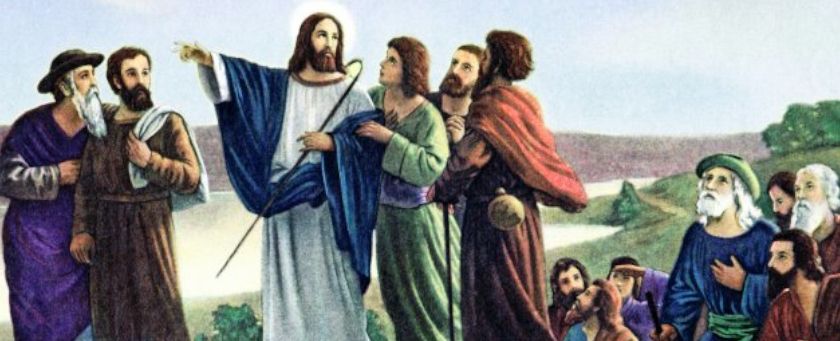World Mission Sunday: I Have Called You By Name
Twenty-Nineth Sunday of Ordinary Time, Year A

Readings:
Is. 45:1, 4-6; Ps. 96; 1 Thess. 1:1-5b; Matt. 22:15-21
Today is World Mission Sunday, and we thank God for His mercy on all missionaries, and the people they serve around the world. Today, we highlight the great commission of Jesus, who as he ascended into heaven commanded his disciples: “Go, therefore, and make disciples of all nations, baptizing them in the name of the Father, and of the Son, and of the holy Spirit, teaching them to observe all that I have commanded you” (Matt. 28:19-20a). We are the recipients of that teaching, which was handed on to us through the Church. This was not by accident, for God has a plan, and each of us, by our own conversion, our own learning, our own commitment, and our own faith, we are now part of that plan for the next generation. So, today, we embrace that mission as disciples of Jesus, who says, “Let the children come to me, and do not prevent them; for the kingdom of heaven belongs to such as these” (Matt. 19:14). And whether we pass the faith on to little children or grown adults, through baptism, we all become children of God, fulfilling Jesus’ prayer to the Father, “so that they may all be one…” (John 17:21).
This is echoed by the prophet Isaiah in today’s first reading, who says, “I have called you by your name….” The Lord was speaking to the Persian King Cyrus, whom the Israelites lauded as a Messiah, sent by God to end their the captivity to Babylon and return them back to Jerusalem, the Holy City. As Jesus reminded us last week, “Many are invited, but few are chosen” (Matt. 22:14). In the case of King Cyrus, he was chosen by God to carry out his will of conquering Babylon and setting Israel free. What might we learn from this? Put simply, the Lord works through anyone. But, how much more will he accomplish through those who believe? How much more can any of us do to bring about his will in our lives and in the life of the Church?
The great missionary of the early Church, St. Paul, writes to the community in Thessalonica, which was undergoing persecution for their faith. But, despite their struggles, they persevered in the faith, and for that St. Paul thanks God continuously for their works of faith and labor of love and endurance in hope in Jesus Christ. As St. James reminds us, “For just as a body without a spirit is dead, so also faith without works is dead” (James 2:26). Our faith ought to give us the strength needed to labor for one another with love and endurance. Sharing Christ is not a chore, it is a ticket to life, and the Thessalonians learned that very early on. We do well to learn from their example of patient endurance and labor for the sake of the kingdom.
And so, on this World Mission Sunday, let us prayerfully consider the ways in which we labor in the Lord’s vineyard. Remember those parables of the rich landowner Jesus taught. He was speaking to people who wanted the kingdom only for themselves. Such a faith is dead, because whatever works may be done are for all the wrong reasons. They are destructive and divisive. Rather, as rightful heirs to the kingdom, as baptized children of God, our works in the Lord’s vineyard need to bear fruit. How can anyone feast without an abundant harvest?
Now for some ways we might bear fruit? The first step is always prayer. If we are not praying regularly, how can we know what the Lord wants us to do? Next, as part of that prayer, ask the Lord to reveal how He wants us to serve him. We might ask, “Lord, what role do you want me to play in the mission of the Church?” Is it to reach out to family members who are no longer practicing the faith? Is it to lift up a certain nation or community in prayer? Can we offer prayers and Novenas for people in poor areas of the world? If we are able, might we offer financial support? We all know how difficult things have been because of the pandemic, but consider how much more difficult it has been for struggling nations in mission territories without proper medical support. We can help them through the mission of the Church.
No matter how we discern to respond to the Church’s mission, we should do so with the fullness of charity. St. Paul says, “What do you have that you have not received?” (1 Cor. 4:7). So, as we turn to the celebration of the Eucharist, to receive the fullness of Christ in the Most Blessed Sacrament, may our communion be one in solidarity with all missionaries throughout the world, and may our faith, our charity, our endurance in hope in Christ, help us to carry out the mission of Jesus in our age for the sake of generations to come.
Given during the COVID-19 pandemic.





Share this post
Twitter
Facebook
Pinterest
Email